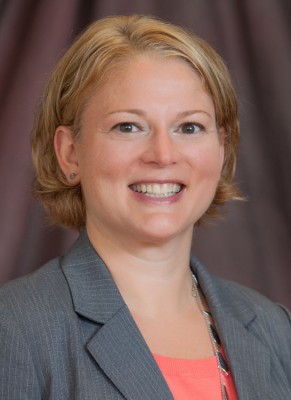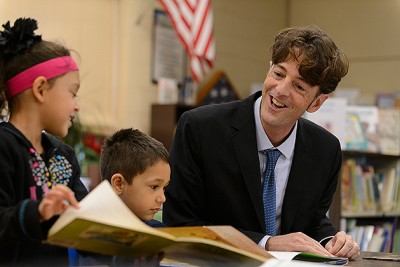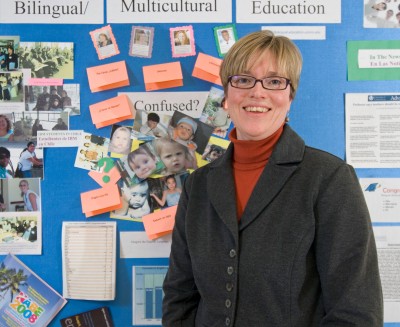This year, the U.S. Department of Education’s prominent Institute of Education Sciences (IES) awarded just 48 research grants to United States scholars. Neag School of Education faculty members received three of them.
“The huge number of proposals submitted, combined with the shrinking amount of federal research dollars, made this year’s process highly competitive, so of course we’re thrilled,” said Neag Associate Dean for Research Sandra M. Chafouleas. “Each of these diverse projects also received a significant amount of money.”
Totaling $4.5 million, the three grants will fund:
 Exploring the Status and Impact of School-Based Behavior Screening Practices in a National Sample: Implications for Systems, Policy, and Research. The project will examine the relationship between students’ mental, emotional and behavioral health and their education outcomes. Chafouleas, also a professor in Neag’s school psychology program, is principal investigator. Co-principal investigators are two fellow UConn faculty members and a former Neag doctoral student: Betsy McCoach, professor and coordinator of the Neag School’s Measurement, Evaluation and Assessment Program; Jennifer Dineen, director of the Graduate Program in Survey Research for the College of Liberal Arts and Sciences’ Department of Public Policy; and Amy Briesch, an assistant professor of counseling and applied psychology at Northeastern University, who in 2009 earned a PhD in Educational Psychology from the Neag School. Over the course of the project, data will be collected from 2,000 U.S. public school districts.
Exploring the Status and Impact of School-Based Behavior Screening Practices in a National Sample: Implications for Systems, Policy, and Research. The project will examine the relationship between students’ mental, emotional and behavioral health and their education outcomes. Chafouleas, also a professor in Neag’s school psychology program, is principal investigator. Co-principal investigators are two fellow UConn faculty members and a former Neag doctoral student: Betsy McCoach, professor and coordinator of the Neag School’s Measurement, Evaluation and Assessment Program; Jennifer Dineen, director of the Graduate Program in Survey Research for the College of Liberal Arts and Sciences’ Department of Public Policy; and Amy Briesch, an assistant professor of counseling and applied psychology at Northeastern University, who in 2009 earned a PhD in Educational Psychology from the Neag School. Over the course of the project, data will be collected from 2,000 U.S. public school districts.
“There’s never been a national study that’s compared the kinds of behavioral screening practices schools have in place, examined whether kids being screened are meeting benchmarks and, if they’re not, looked at what kinds of services these students are receiving,” Chafouleas said. “Our goal is to identify the screening practices that can help identify the kinds of social, emotional and behavioral supports students need for academic success, which we hope will lead to further research and the development of best practices of how to get these supports in place.”
 Teaching the Vocabulary of Comprehension: A Technology-Enhanced System to Enhance At-Risk 3rd Graders’ Acquisition and Application of Essential Vocabulary. The study will allow Neag Professor of Educational Psychology and Special Education Michael Coyne to continue his work to improve students’ language and literacy achievement. This new study will develop and evaluate a computerized, interactive vocabulary intervention system that will be responsive to students’ individual needs. Coyne will collaborate with principal investigator Deborah Simmons, professor of Special Education at Texas A&M University, and fellow co-principal investigator Melissa Fogarty, assistant research scientist in Educational Psychology at Texas A&M. They’ll begin their work in Connecticut, partnering with third-grade teachers in the Windsor School District.
Teaching the Vocabulary of Comprehension: A Technology-Enhanced System to Enhance At-Risk 3rd Graders’ Acquisition and Application of Essential Vocabulary. The study will allow Neag Professor of Educational Psychology and Special Education Michael Coyne to continue his work to improve students’ language and literacy achievement. This new study will develop and evaluate a computerized, interactive vocabulary intervention system that will be responsive to students’ individual needs. Coyne will collaborate with principal investigator Deborah Simmons, professor of Special Education at Texas A&M University, and fellow co-principal investigator Melissa Fogarty, assistant research scientist in Educational Psychology at Texas A&M. They’ll begin their work in Connecticut, partnering with third-grade teachers in the Windsor School District.
“Third grade is a critical time, when students are transitioning from learning to read, to reading to learn–in other words, using their reading skills and vocabulary knowledge to construct meaning from texts across all content areas,” Coyne explained. “Common Core standards also outline rigorous reading comprehension expectations, which means third-graders at risk for reading difficulties need intensive, individualized and responsive support. We believe this system can help these students develop the ‘vocabulary of comprehension’ needed to close the achievement gap and ensure reading success.”
 Writing for English Language Learners: Exploring the Relationship Between Writing Instruction and Student Outcomes. With colleagues she met while earning her doctorate at the Harvard Graduate School of Education, Neag Associate Professor of Bilingual Education Elizabeth Howard will explore both the quality of writing instruction and the quality of writing outcomes among Latino, Spanish-speaking students. “The ability to write well is so important for all of our students, but our emergent bilingual students are particularly in need of high-quality instruction, as such a high percentage are currently performing below basic threshold levels on standardized assessments,” said Howard, who will serve as co-principal investigator along with Linda Caswell, a literacy and education expert at the nonprofit, Massachusetts-based Abt Associates; Mary Avalos, an assistant research professor at the University of Miami; and Maria Brisk, a professor of teacher education in the Lynch School of Education at Boston College. Principal investigator is Mileidis Gort, a former assistant professor at the Neag School, who’s now an associate professor of bilingualism and biliteracy in early childhood at Ohio State University.
Writing for English Language Learners: Exploring the Relationship Between Writing Instruction and Student Outcomes. With colleagues she met while earning her doctorate at the Harvard Graduate School of Education, Neag Associate Professor of Bilingual Education Elizabeth Howard will explore both the quality of writing instruction and the quality of writing outcomes among Latino, Spanish-speaking students. “The ability to write well is so important for all of our students, but our emergent bilingual students are particularly in need of high-quality instruction, as such a high percentage are currently performing below basic threshold levels on standardized assessments,” said Howard, who will serve as co-principal investigator along with Linda Caswell, a literacy and education expert at the nonprofit, Massachusetts-based Abt Associates; Mary Avalos, an assistant research professor at the University of Miami; and Maria Brisk, a professor of teacher education in the Lynch School of Education at Boston College. Principal investigator is Mileidis Gort, a former assistant professor at the Neag School, who’s now an associate professor of bilingualism and biliteracy in early childhood at Ohio State University.
They’ll perform their field work in fourth-grade classrooms in Florida’s Miami-Dade County, the fourth-largest school district in the U.S., where almost 20 percent of students are ELLs. “The location allows for a large-scale exploratory study that we hope will lead to the development of new writing instructional interventions designed specifically for emergent bilingual students,” Howard added.
All three projects address areas where information is needed to inform national policies and practices, Chafouleas said. They also serve as excellent examples of how the Neag School is using its strengths and expertise to put its strategic plan into action.
Being a state, national and global leader in how educational policies and teaching methods are developed and implemented is part of that plan. Faculty have also been charged to use their expertise to conceptualize groundbreaking research opportunities, collaborate with other leading scholars, and pursue external funding sources like IES.
The creation of the new position of Associate Dean for Research, which Chafouleas assumed in July, is also key to the advancement of the Neag School. “We have a driven, enthusiastic team at the Neag School, and our investigators represent so many wonderful areas of expertise,” Chafouleas said. “These awards represent examples as to how Neag scholars put our collective expertise together and make important differences in the lives of child.”
 Facebook
Facebook
 Twitter
Twitter
 LinkedIn
LinkedIn
